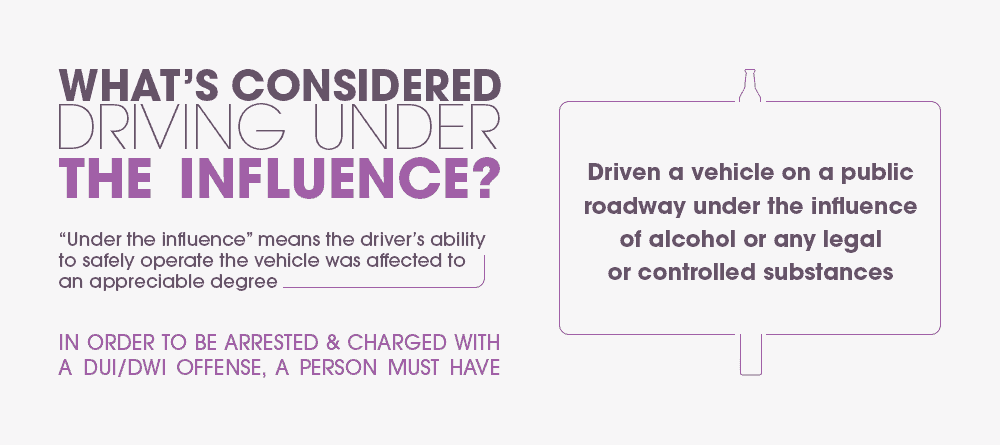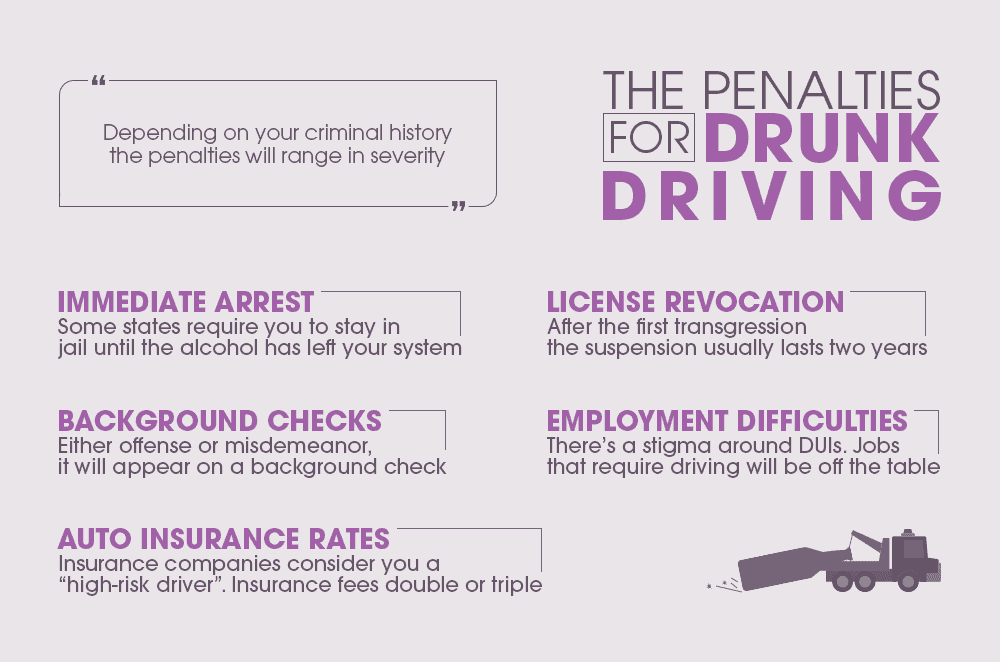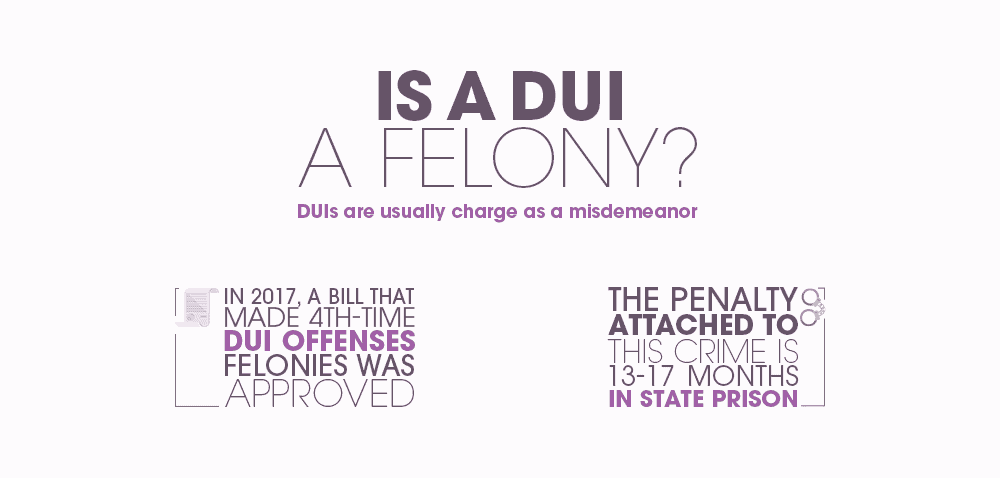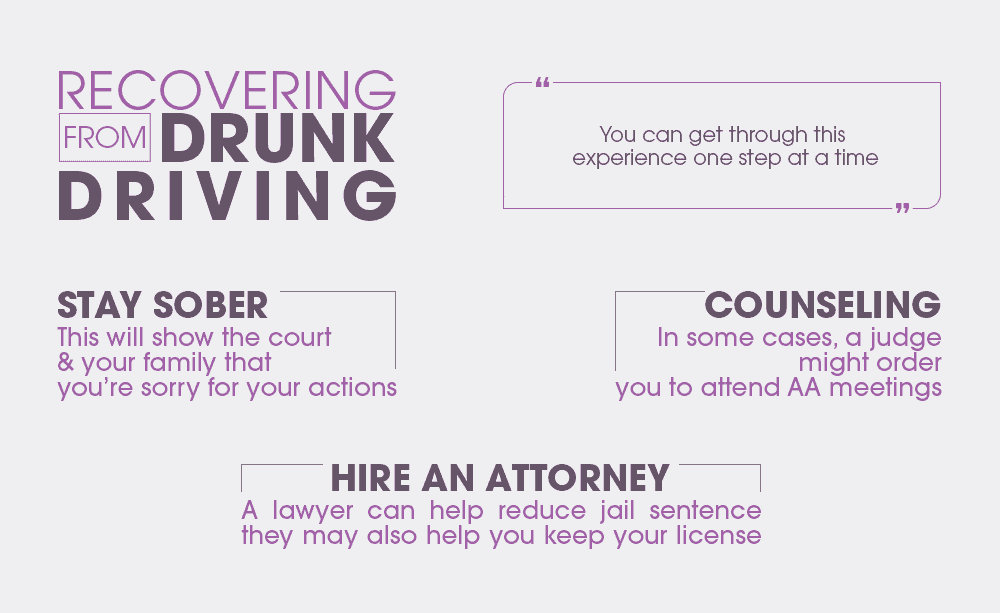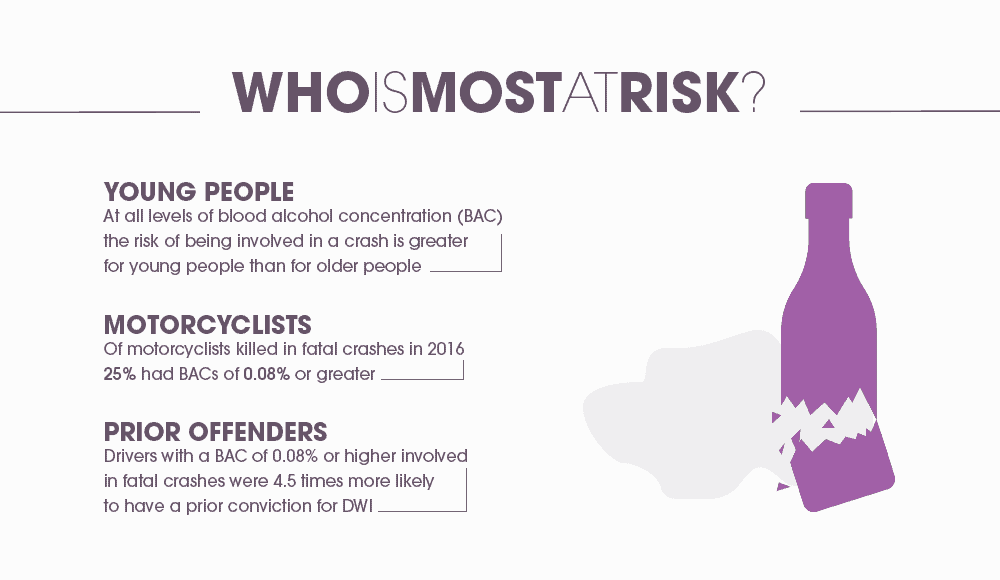How can this be happening? I’ve never even been pulled over, and now I’m being arrested for a DUI? We were just supposed to spend a fun night as friends. I didn’t even drink that much. That wasn’t supposed to happen. This is the worst night of my life. This scenario happens more often than you would think. In 2014 alone, more than 1.1 million drivers were arrested for DUI. A DUI is a very serious offense, and those found guilty find themselves facing severe consequences. The penalties for driving under the influence can include:
- Heavy fines
- A suspended or revoked license
- Increased insurance premiums
- Jail time
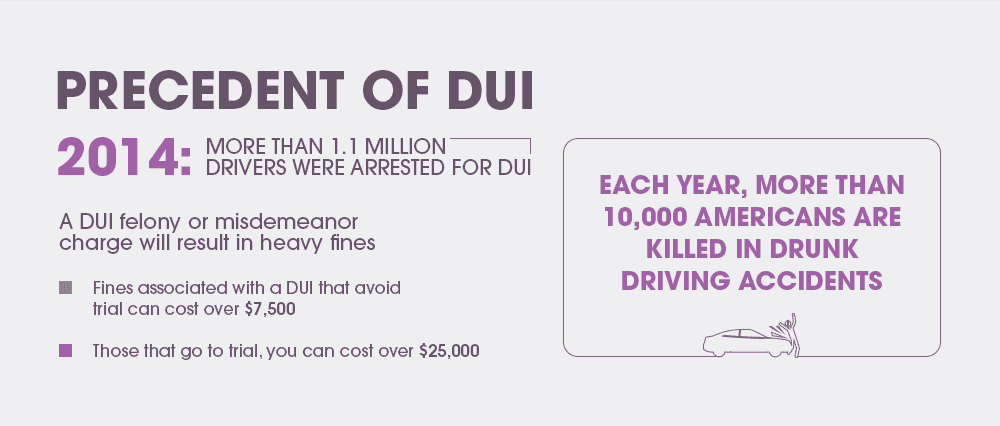 A DUI felony or misdemeanor charge will result in heavy fines. Fines associated with a DUI that avoids trial can cost over $7,500. If you do go to trial, you could be looking at over $25,000. Not to mention, if you break DUI laws, you may find yourself without a license. This can threaten your ability to get to work. So what is a person to do? How does someone live their life after they’re caught drunk driving?
A DUI felony or misdemeanor charge will result in heavy fines. Fines associated with a DUI that avoids trial can cost over $7,500. If you do go to trial, you could be looking at over $25,000. Not to mention, if you break DUI laws, you may find yourself without a license. This can threaten your ability to get to work. So what is a person to do? How does someone live their life after they’re caught drunk driving?
“A DUI can be indicative of an alcohol problem. Take a look at our Alcohol Recovery Program.”
Long-Term DUI Consequences
If you’re convicted of driving under the influence, don’t worry too much. You should, first and foremost, be thankful that you’re still alive. And, if no one else was hurt, you should be thankful for that, too. Each year, more than 10,000 Americans are killed in drunk driving accidents. Luckily, you still have time to get your life back. The initial steps in recovering from a DUI conviction are overwhelming. They’re the biggest challenge in the whole process. As soon as you’re charged, the shock and fear will start to take hold. You’ll find yourself asking questions like: Am I going to lose my job? Is anyone going to insure me now that I have a DUI? How much will insurance cost? Will I ever drive again? Can I travel internationally after getting a DUI? What is my life going to be like now? The consequences of drunk driving are well documented. However, people don’t know what life after a DUI is like until they live through it. If you’ve never been convicted of driving under the influence, it may feel like you’ll never recover. It’s possible to get back on your feet, though. If you stay strong while you manage the consequences of your conviction and seek treatment for alcoholism if you need it, you’ll be fine. You’ll be back to living a normal life before you know it.
The Penalties for Drunk Driving
If you’re caught driving drunk, it’s likely that you’ll face some consequences. Depending on your criminal history and the nature of your arrest, the penalties will range in severity.
Immediate Arrest
The first thing that happens what you’re arrested for a DUI is that you’re taken into custody. The police will bring you to a nearby station. You’ll be fingerprinted. You’ll have a mugshot taken. And you’ll probably spend the night in jail. In most cases, you’ll have the option to call someone. This person will be able to go to the station and pay bail. Some states require you to stay in jail until the alcohol has left your system. Once you’re booked by the police, that arrest will be on your record. Your sentence will be determined in court later on.
Driver’s License Revocation
The biggest thing drunk drivers are worried about is losing their license. Can you drive after a DUI arrest? In many states, including Washington, the crime comes with a mandatory license suspension. This is one of the worst consequences. After the first time you break DUI laws, the suspension usually lasts two years. This makes life after a DUI conviction hard. It can mean losing money and security. If you have a job that requires you to drive, you may lose that job. Plus, losing the ability to drive is a loss of freedom. Life can become difficult when the simplest of errands is a major challenge. Fun activities like visiting family or friends are going to be more difficult. It’s not the end of the world, though. You can take public transit or find a ride. Remember, you’re alive and no one was hurt. You’ll have your license back eventually.
How long does a DUI stay on your driving record?
In the state of Washington, it will stay on your record for a while. Washington DUI laws state that the crime can remain on-record for as long as 15 years. So, even after you get your license back, the offense will still be in your file. This allows insurance companies to see it and adjust their rates accordingly. If you’re arrested again within the 15 year period, the police will know that it’s not your first offense.
Background Checks
It can be difficult to get a job after a DUI. In Washington state, whether the offense is a felony or misdemeanor, it will appear on a background check. Getting a job is difficult enough. It’s even worse when you have the smear of a DUI on your record. Colleges may also do a background check on you. If you’re trying to get into school, seeking financial aid or simply applying for campus housing, they’ll find out about it. Lastly, landlords and property owners may conduct a background check. This can make it hard to secure housing, even if you rent. The criminal record that comes with the conviction is one of the main reasons surviving a DUI is so hard.
Employment Difficulties
When it comes to your professional career, life after a DUI can be demoralizing. Even if you’re already employed, it may cause problems at your current job. You’ll need to have meetings with your boss. You’ll need to attend court, do community service, and possibly serve jail time. If you miss enough work, you may lose your job. If you’re seeking employment, you’ll be at a disadvantage. There’s a stigma around DUIs. This may deter employers from hiring you. Even if the job doesn’t require driving, your record may affect your chances of getting it. Obviously, jobs that require driving will be off the table.
Auto Insurance Rates
Life after a DUI comes with some hefty fines. First, there are the fines given to you by the state. On top of that, insurance rates will become inflated. See, after you’re convicted of drunk driving, insurance companies consider you a “high-risk driver”. In the words of the DMV, high-risk drivers are those “who have a higher potential of filing a claim on his or her car insurance.” Insurance plans for high-risk drivers are very expensive. You may see your insurance fees double or triple after the offense. Some companies may not want to cover you at all. Over time, however, this number will go down. It may take several years, but if you can prove that you’re working to be a better driver, your insurance will eventually come down.
Professional Relationships
A DUI arrest can adversely affect the perception that people have of you. Even if you’re not convicted, the fact that you were arrested for driving drunk may cause your employer or co-workers to think less of you. In some cities, DUI arrests are publicized in local media. This can permanently tarnish your reputation. If your reputation is stained by the conviction, don’t give it too much thought. At this point in your post-DUI life, you have bigger things to worry about. It might hurt your feelings to know that people see you as a drunk driver, but don’t worry. It’s time to focus on rebuilding your life, clearing your record and maintaining your sobriety.
“Get your loved one the help they need. Our substance use disorder program accepts many health insurance plans, this is our residential program.”
Is a DUI a Felony?
In most cases, a DUI is charged as a misdemeanor. This law, however, varies from state to state. Washington state, for example, is known for having very lax drunk driving laws. However, they are taking steps to cut down on the number of alcohol-related accidents that occur each year. In 2017, the state government approved a bill that made 4th-time DUI offenses felonies. Therefore, anyone who is caught drunk driving more than three times in less than 10 years will be charged as felons. Anyone who is caught drunk driving more than five times, no matter the timeline, will also be charged as felons. The penalty attached to this crime is 13-17 months in state prison. It should go without saying, however, that 4 DUIs are a sign of a bigger problem. Anyone who drunk drives that frequently is likely to have alcohol use disorder. If you’ve already racked up a couple of convictions, you would benefit from seeking some treatment for alcoholism.
Quick Question: Is it the Same as a DWI?
DWI, DUI, and OUI are three terms used to describe the same crime. DWI stands for “driving while intoxicated”. DUI stands for “driving under the influence”. OUI stands for “operating under the influence”. They are all used by law enforcement to charge people who are driving a motor vehicle while impaired. Some states call the crime DUI or OUI while others call it DWI. Massachusetts, for example, uses the term OUI. Washington state uses the term DUI. New York is one of many states that uses DWI. The penalties for these crimes differ based on state laws. Whichever state you’re in, these acronyms don’t just apply to drunk driving. They also include driving under the influence of illegal drugs and driving under the influence of prescription drugs. If your ability to drive is impaired by prescription meds, even if taken legally, you can be charged with this crime.
Are Sobriety Checkpoints Legal?
Were you caught drunk driving by police at a DUI checkpoint? Wondering if they’re even legal? Well, yes. In 38 states, law enforcement is authorized to set up checkpoints to catch drunk drivers. They’ll usually block the road and require every driver to roll down their window before passing through. Usually, the police will speak with the driver for 30-60 seconds in order to determine whether or not they’re drunk. If the officer suspects that the driver is impaired, they’ll have the driver pull over and step out for further investigation. This may include breathalyzer tests and other assessments depending on which state it occurs in. In the words of the National Institute of Justice, “Sobriety checkpoints are police operations that time to reduce the number of alcohol-related car crashes by preventing people from driving under the influence of alcohol and other substances.”
What is an Aggravated DUI?
There are certain factors that, in the eyes of the law, make some drunk driving cases worse than others. These cases are called “aggravated DUIs” are come with a heftier punishment. If you’ve violated any of these conditions, you may find yourself with a higher fine, a longer suspension, or a larger prison sentence: Unusually high blood-alcohol content: The legal limit in every state is currently 0.8%. Anything higher than that is grounds for arrest. Those who are caught with a BAC far higher than that may be considered for an aggravated DUI. Children in the car: Driving drunk with minors in your vehicle? The state is probably going to charge you with an aggravated case. In many states, driving drunk in a school zone is considered the same as having children in your car. Several convictions: The more offenses you have, the larger the penalty. Repeat offenders are treated as aggravated cases. Driving extremely fast: The judge will take your speed into consideration. Driving fast is considered to be aggravated behavior and you’ll be punished accordingly. Driving without a license: If your license has been revoked for a DUI or any other reason, you’re expected to stay off the road. Those who are caught drunk driving without a license will face some serious penalties.
Recovering from a Drunk Driving Conviction
Surviving life after a DUI is difficult. But it’s entirely possible. If you or a loved one have been faced with this sad reality, don’t panic. You can get through this experience one step at a time. Here are some tips to help you deal with the legal and emotional effects of the charge.
First and Foremost: Booze Won’t Help the Situation
The most important thing to remember is that alcohol won’t fix anything. While your initial response might be to reach for the bottle, it’s only going to make things worse. Drinking more is only going to cloud your judgment. What you need to do is to commit to staying clean. Even if you don’t consider yourself an addict, sobriety is important to you right now. Staying sober will show the court that you’re sorry for your actions. If your family is angry, it will help them to see your remorse, too. Most importantly, it will help to prevent you from spiraling further into a pit of alcoholism. You need a clear head at this point in time, so avoid drinking at all costs.
Hire an Attorney
When you’re arrested for a DUI, you need legal representation. Unless you’re a lawyer, you’re in no position to represent yourself in court. It’s best to consult an expert who can help you navigate the process. A strong lawyer can help reduce your charges. The conviction process will be less stressful with a lawyer by your side. Driving under the influence comes with serious consequences. This includes jail time. A lawyer can help to reduce the jail sentence if you’re facing one. They may also help you to keep your license. A great thing that lawyers do is to help you avoid trial. They do this by fighting for a “plea bargain”. If offered a plea bargain, you’ll most likely be sentenced to community service and a suspended license. You may get a fine, but you’re likely to avoid jail. Ultimately, less time in court means less money on lawyers. It can also help you keep your job.
How do I find a DUI attorney in Washington?
If you’re looking for a lawyer to help you, start by asking your friends and family. If you know anyone who’s been through the experience, they may be able to recommend someone. If you don’t know anyone with a DUI, search around online. Read reviews, reach out to people online, and find someone with a good track record. Here’s a list of DUI attorneys working in Washington. This list may be able to help you find someone.
Lean on Your Friends and Family
No one deserves to go through this experience alone. And no one should go through it in secret. Life after a DUI is extremely hard, and the more support that you have around you, the easier it will be. You may need help with certain tasks during this time. For example, if you can’t drive, you may need them to give you rides. Don’t be afraid to ask for help. Knowing that you have people around you who care can help to ease the suffering. Your family might be angry with you. Driving drunk, after all, is both dangerous and illegal. Don’t lie to them about the situation. Be honest about what happened and try to do better. If you show your loved ones that you’re working to be a better person, they’ll probably forgive you.
Seek Out a Support Group
Whether your family is angry with you or not, you should consider reaching out for additional help. We recommend that you attend Alcoholics Anonymous meetings. These meetings are a place for people who suffer from alcohol addiction. Even if you don’t think you’re an alcoholic, these meetings may have something to offer you. The organization’s members have been where you are. Many of them have gotten DUIs themselves and lived through the struggle. They can offer advice and help you to sort out your feelings. In some cases, a judge might order you to attend AA meetings. This isn’t a bad thing. AA changes people’s lives. You can go to meetings, talk about your emotions, and listen to the stories of other people. Attending AA, even if you’re not ordered to, will show the court that you’re working to get your habit under control. Looking for an Alcoholics Anonymous meeting? Check out our Addiction Resources page for a list of AA meetings in Washington state.
Call a Counselor or Therapist
Sometimes, we need help beyond what AA meetings can offer. If you feel that way, consider seeking personal counseling or therapy. Oftentimes, therapy is helpful for alcoholics in their initial stages of recovery. Therapy might be mandated as part of your sentence. Don’t get upset about that. Life after a DUI is very stressful. A therapist can help you cope with stress. They’ll provide you with the tools you need to stay calm. Click here to ask our addiction counselor a question.
Consider Addiction Treatment
A DUI can be a sign of a bigger problem. While it’s not always the case, many people who drive drunk are addicted to alcohol. If you’re charged with drunk driving more than once, that’s most likely the case. Remember, drunk driving is very dangerous. When you drive under the influence, you risk your own life and the lives of those around you. People often make this irrational choice because they’re powerless over alcohol. Substance abuse disorder is a serious disease. Those who suffer from it are unable to control their alcohol consumption. This condition destroys lives when it’s not treated.
Treatment Options for Alcoholics
There are two main components to treatment for alcohol addiction. The first stage is to detox. This is when the alcoholic quits drinking and goes through withdrawals. When detoxing from alcohol, the addict’s body will rid itself of all of the booze in it. Detox usually happens in a professional treatment facility. Alcohol withdrawals can be deadly. It’s important, therefore, that people are supervised when detoxifying. After completing detox, alcoholics should go through rehab. This is where the addict learns to manage their addictive behavior. They’ll meet with doctors and counselors for individual therapy sessions. They’ll also gather with other addicts for group support meetings. Alcohol rehab comes in two forms: inpatient and outpatient. Inpatient is residential. The alcoholic lives in the treatment center for several weeks as they work to get sober. Outpatient is non-residential. Outpatient residents attend daily sessions at the facility and return home at night. The best form of rehab is different for each addict.
Complete Your DUI Classes
In many states, a DUI conviction comes with mandatory DUI classes. These classes aim to educate people about the dangers of drunk driving. It may seem silly (even drunk drivers know that it’s dangerous), but these classes can be helpful. They often illuminate just how irresponsible the behavior is. In some cases, people who get DUIs are not necessarily alcoholics. We all make mistakes, of course. So, some people who are sentenced to DUI courses get upset about being treated like an alcoholic. If that sounds like you, don’t let it get you down. Just attend your classes, do the necessary work and move on. It’s crucial that you don’t skip your classes. Failing to attend DUI classes may result in further fines, a longer license suspension and potential jail time. The court wants to know that you’re working to be a better person so make sure to show them that you are.
Avoid Social Triggers
For many people, drinking is a social activity. If you find that you are more prone to drinking in certain social situations, avoid them. If you find yourself returning to these situations despite their effect on your judgment, you may have a drinking problem. In that case, alcohol rehab may be necessary. Life after a DUI requires you to make better decisions. This doesn’t mean, of course, that you have to skip your friend’s wedding to avoid drinking at the reception. It does mean, however, that you may need to limit the amount of time you spend there. You might want to set an alarm or ask a friend if they’d tell you when it’s time to leave.
How to Manage Triggers
In order to avoid triggers, you need to identify them first. Then, you need to plan what you’ll do when these triggers present themselves. We suggest the following: Find a supportive friend that you can call when a trigger arises: In AA, members choose a “sponsor”. A sponsor is a sober person chosen by the addict who offers guidance throughout the recovery process. Even if you’re not an AA member, find someone that you can call when you need support. Get in tune with your feelings: Before you leave the house, figure out how you feel about the event you’re going to. Does it make you feel anxious? Are you tired? If you have any negative emotions about the event itself or the people there, you may need to leave early. Some pre-event planning can help you to avoid a relapse. Remind yourself why you’re sober: Once you have a DUI on your record, there’s a lot a stake for you. Another DUI could lead to further charges. Even if you’re not driving, a relapse could force you further into the pit of alcoholism. Your life will be better if you stay sober, so make sure to remind yourself of that.
Find New Hobbies and Activities
After you quit drinking, you’ll want to fill your life with other things. A drinking habit, after all, takes up a lot of time. Once you stop drinking, you’ll be surprised at how long the day feels. Hobbies can help to keep your mind occupied while you fight the urge to relapse. Running, reading, drawing, and biking are some common hobbies among newly sober people. Your hobby should be something that you’re passionate about. It should be something that relieves stress and prevents relapse. Yoga can be helpful because it calms the mind. It is highly recommended as a holistic method of addiction recovery. Mindfulness meditation is good, too. Along with running, working out and other physical activities, it increases your mood and helps to increase your sense of self-worth.
Evaluate Your Friends
Living life after a DUI requires you to take things more seriously. Unfortunately, your friends and family might not. If the people around you encourage reckless behavior, you may need to step away from them for a while. It’s challenging, especially with family, to put your foot down. But, you need to let them know that you’re a changed person and that being around them is unhealthy. Friends and family should be willing to support you. This doesn’t mean that they have to stop drinking, too. It does mean, however, that they should be respectful of your decision. They shouldn’t encourage you to behave irresponsibly. Even if your current friends respect your sobriety, you may want to connect with some other sober people. Strong social connections are helpful for newly sober people. You may find that your new friends understand your struggle better than anyone else because they’ve lived through the same things.
Move on and Rebuild
Life after a DUI will leave you with many questions. You may wonder about the direction of your life. Remember, you can move on if you make good choices. You don’t need to leave town. You don’t need to isolate. There’s a life ahead of you if you get the treatment you need. What you need to do is own up to your mistakes. It helps to seek support wherever possible. Addiction therapy might help. If you’re fired from your job, there are plenty of workplaces that will hire you as long as you’re honest. The DUI will appear on your background check, but as long as you live an honest life, you’ll be fine. Looking for some support in your post-DUI life? We can assist you. Our expert staff has helped endless people find serenity in their struggle.
“We treat both addiction and co-occurring disorders and accept many health insurance plans. Take a look at our inpatient program.”
Tiger Woods’ DUI: No One is Immune to Drunk Driving Laws
DUI laws apply to all of us, even celebrities. In 2017, for example, Tiger Woods was arrested for driving under the influence. Although his car was parked when they found him, the car showed signs of damage. When asked to step out, Woods was subjected to a field sobriety test. He failed it. In a public statement, the golfer said that he’d gotten behind the wheel after taking a mixture of prescription meds. He didn’t realize, at the time, that the drug cocktail would affect him the way it did. In order to avoid serious charges, Woods enrolled in a DUI offender program. He took classes and completed a number of community service hours. He also participated in an intensive outpatient rehab program. Woods’ case is a valuable lesson to all of us. It teaches us, first and foremost, that no one is allowed to drunk drive. The laws around it apply to everyone. Secondly, it shows us that surviving life after a DUI is entirely possible. It might be inconvenient, but we can use the experience to become better people.
Other Celebrities Who’ve Been Arrested for Drunk Driving
Many famous people have been arrested for breaking DUI laws. Some people you might recognize include:
Paris Hilton
In 2006, Paris Hilton received a DUI when she was caught driving with a blood-alcohol level just above the legal limit. She’s reported to have “cut back on partying” since the incident.
Michael Phelps
The swimmer pled guilty to driving under the influence in 2014. Phelps’ DUI was the peak of what he refers to as “a downward spiral” in his career. Michael Floyd NFL wide receiver Michael Floyd was arrested in 2016 after a field sobriety test showed a blood-alcohol content of .0217. The incident was captured on video and published by TMZ.
Shauna Lake
Famed Salt Lake City news anchor Shauna Lake was arrested for a DUI in 2017. A week later, she publicly apologized for behavior. “I drank alcohol after I got off of work and then chose to get behind the wheel of my car. I am ashamed and humiliated by my decision,” she said live on her show.
Debbie Ryan
Disney star Debbie Ryan is currently serving a three-year probation sentence for drunk driving. She was charged with two counts of driving under the influence after she crashed her car.
Blair St. Clair
Blair St. Clair, famous for being a contestant on RuPaul’s Drag Race, was arrested for a DUI years before she was on the game show. St. Clair has been very open about her struggles with addiction.
Nicole Richie
Nicole Richie served a four-day sentence after being charged with drunk driving. The celebrity was pulled over after driving the wrong way down a California highway. “If I could personally apologize to every single person that has lost a loved one to drunk driving, I would.” ~Nicole Richie on her DUI arrest
Tim Allen
Actor Tim Allen has always been honest about his problems with drugs and alcohol. Although he’s sober today, he was arrested and charged with operating under the influence in 1996.
Bella Hadid
Model Bella Hadid was arrested at the age of 17 for a DUI. She is reported to have turned toward sobriety since the incident.
Steve Wilkos
Former Jerry Springer cast member Steve Wilkos received a DUI in early 2018. A Marine Corps veteran, Wilkos was arrested after crashing his car in Connecticut. These celebrity stories don’t, by any means, justify drunk driving. They do, however, help to show us that there’s still life after a DUI conviction. Recovery just requires us to reflect on our decisions and commit to making better choices.
It’s Possible to Survive Life After a DUI
You’re not a bad person just because you broke DUI laws. As we pointed out above, millions of people are arrested for drunk driving every year. Sure, it’s irresponsible. Yes, it’s dangerous. But, as long as everyone walked away alright, there’s still hope. If you were arrested for a drunk driving incident and don’t know where to turn, contact us. We’ve helped many people to get their lives back on track. We’d love to do the same for you. One of our representatives can help to assess your drinking habit, recommend treatment options, or even suggest a DUI attorney. There’s a road to recovery ahead of you. We can help you take the first steps.
What Did you Think About This Blog?
Give it a Rating!

